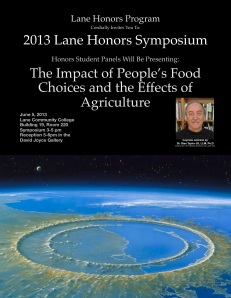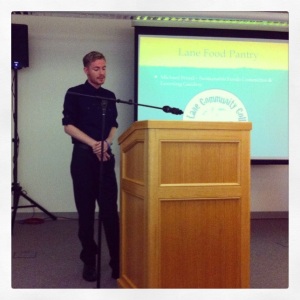June 5th was the U.N.’s annual World Environment Day. It was also the day I spoke to an audience of 50 about my academic research on agricultural greenhouse gas emissions and dietary solutions to mitigate them. Aside from my ten minute presentation, I had the honor of introducing and thanking the Honors Program’s Spring Symposium keynote speaker Dr. Stan Taylor. Five other honors students spoke as well. On this page you will find the symposium poster, invitation, a picture of me speaking, my powerpoint slides, and my final reflection essay.
Invitation:
You’re cordially invited,
Join us Wednesday, June 5th for the Honors Spring Symposium! The symposium is the culmination of research conducted in the honors capstone seminar. It will feature a key note address by Stan Taylor and student panel discussions and presentations addressing the impact of food choices and agricultural practices. The symposium will be held from 3-5 pm in Building 19, Room 220 with a reception and light hors d’oeuvres to follow from 5-6 pm in the CML’s David Joyce Gallery (second floor, directly outside Building 19, Room 220). This is a great opportunity to meet the honors community at Lane and be engaged with this relevant campus-wide dialogue.
Essay document: Capstone Seminar Final Reflection
Kevin Loder
6/10/2013
IDS 299_H
Ce Rosenow
Capstone Seminar Final Reflection
To what extent did your thoughts about academic research change during the capstone seminar?
From the beginning with choosing a topic and forming the research question, up till the end, I felt critical thinking was involved in every stage of this academic research project. One of my natural strengths is being highly observant; I absolutely loved this opportunity to bring multiple sources together. The challenge for me was the technical writing side. In my group, I saw that others knew I was better suited for ideas and speaking. That is what they allowed me to accomplish and excel at. I did participate in the technical writing, but that is my area for improvement; this course changed my understanding of how formal the process can be vs. spontaneous.
Reading the class textbook, The craft of research, a second time through allowed some of the complexity of the text to actually sink into my mind. The first read through raised my curiosity and respect for using critical thinking. Recognizing when to move out of a victim struggling mindset with a practical problem, and choosing to proactively respond by looking at challenges from a researching problem perspective, has been a beneficial takeaway for me. Now this time I’ve better grasped the big picture of the whole research process, including warrants that connect my reasons and claims based on evidence.
To what extent were you able to continue thinking critically (identify and testing assumptions) during the research process this term?
It was the counterargument point in the process when I felt I truly began to think critically to the level necessary for this project. At first I was just getting comfortable with the group and feeling like there was more than enough time. Around the same time of the counterarguments was when tension started to be felt in my group, and I began applying critical thinking in group communications. Once I got firm on my claims and reasons I was able to consistently remain a critical thinker throughout the process.
How did your understanding of gathering and evaluating information change over the term?
I appreciated that both Anne McGrail and Sandy Jensen were guest speakers to our class, sharing digital tools for gathering and sharing information. Anne explained digital databases, which I saw as an environmentally friendly alternative to printing everything, let alone ease of searching. Sandy showed us how we as a group could use Google Docs to share access to our documents. As for evaluating information, librarian Jenn Klaudinyi demonstrated various ways to search for scholarly articles, and how to check their sources. What I learned is what an advantage technology has put the ability to research at. Countless hours searching are now saved thanks to the digital databases and shared access. I cringe at the thought of the beginnings of research. It is important to note that my research was academic; we did not conduct any of the research ourselves, such as lab work. That type of research would be the next level of critical thinking I now feel up for the challenge for.
How did your understanding of counterarguments develop this term?
My sources of counterarguments this term proved to be very critical to our research question. My group was quite focused on food mileage until I discovered an article which acknowledge the importance, but claimed there are more significant considerations to be had. This changed my focus, and that is when I began researching beef as one of the more major contributors in agriculture to greenhouse gas emissions. From this valuable experience, I will consider counterarguments earlier in my research process.
To what extent do you consider yourself a scholar, and to what extent did that view of yourself change or not change this term?
Thanks to this Honors Program, I now have a desire to one day be respected as a scholar. I have a habitual nature of getting obsessed about my strong interests; I believe I can academically apply that passion towards scholarly research. The question still remains at what I’ll become a scholar in, but I now have the foundational understanding on which to proudly build.


